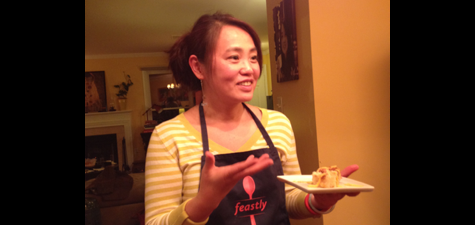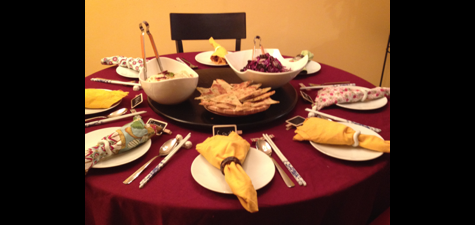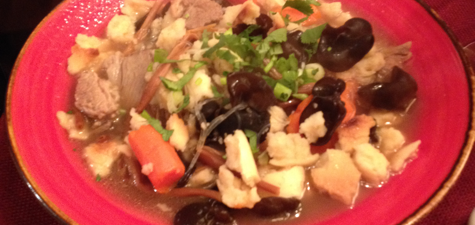
How many times have you eaten a home cooked dinner and wondered why restaurant food rarely captures the authenticity of home cooking? Sure, there are some awful home cooks, but there are also some great ones who take the time to cook dishes that mean something to them and their guests.
Super Chef tried a sample meal on Feastly, one of the dinner share websites that aim to remedy the lack of home cooking and encourage members to share a camaraderie around a dinner table. Noah Karesh founded Feastly in Washington DC in 2011.
In lowering the barriers to entry for cooks to share their skills and stories with the world, he wanted to let cooks monetize their passions and provide exciting new food opportunities for eaters.
Sign up to cook a meal for a set fee, number of guests, and menu, and then see who comes to dinner. The idea is to write your invitation to the meal as cleverly as you can, and attract guests who are either visiting the city or living there.
Recently, the meals on Feastly, range from a gluten-free dinner entitled Wheat Not? And a Soviet Food dinner with both pelmini and vareniki. To see what all the hoopla is about, Super Chef chose
“President Xi Set Meal” — What the Chinese President is Having for Dinner
created by Mei who was born in Xi’an. The dinner focused on the cuisine of her native city, one of the best in Northern China – think handmade noodles, hot stews, and intense flavors. Host Mei wrote:
When Chinese President Xi treated Lien Chan, honorary Chairman of the Kuomintang from Taiwan, to dishes of their shared hometown at the Diaoyutai State Guesthouse in Beijing, the Cross-Strait relations sounded more nostalgic than complicating.
The dinner was attended by five guests from the area – one of who had traveled close to an hour to be there, and one of Mei’s friends who assisted with the cooking. Her living room was comfortable and colorful – there were nibbles served with a chilled plum wine cocktail. Once guest commented, “At a restaurant, you wouldn’t find anyone to tell you where this food is from and why it is special.” Mei herself explained why she hosts dinners: “I like to cook and I used to have parties, but I had the same friends over and over. I figure I can meet new people and feed new friends with Feastly. So far I have hosted 12 meals.”
Some of the guests already knew each other and so the atmosphere was even more inviting. The table was set with lovely ceramic chopsticks, each balanced on a different chop stick holder.

Here is the menu:
Sliced lotus root and red chili pepper silvers with a home-made Sichuan peppercorn & sesame oil vinaigrette
Red Cabbage, Sweet Onion and Wood-Ear Mushroom Salad 紫卷心菜拌木耳洋葱
A salad I don’t mind having it everyday. The wood-ear mushroom in this salad is from the deep forest in Northeast China.Second Course
Liang Pi – “Cold Skin” Noodles 凉皮
A specialty dish originated from Shaanxi province. The noodles will be made from scratch and tossed with soybean sprout, cucumber and homemade sauceLamb Paomo — Home-made Bread Soaked in Lamb Soup 羊肉泡馍
A typical food eaten in Xi’an: homemade flatbread broken into bits boiled with lamb broth. Before noodles were cut into strips this was considered the earliest version of noodles

Third Course
Sweet Rice Cake 烤年糕
A Chinese style Brownie made with sweet rice flour, nuts and dry fruit
Mei also made scallion pancakes from scratch. Everything was placed on a lazy Susan, so that the guests could easily help themselves – again and again. The salads were superb – garlicky and crunchy. Mei explained that her mother had brought dry wood ear mushrooms collected in the Northeast of China and that they were superior to the fresh wood ear mushrooms available in local Asian stores. She used Szechuan pepper sizzled in hot oil in the dressing of red cabbage and onion that gave a mild heat to the dish. The cold noodles were chewy and hearty with a garlicky, sesame dressing. Mei explained that the noodle batter was pour out and then steamed and cut into noodle pieces.
For the main course, Mei had made hard bread buns, rather like stiff English muffins. She instructed her guests to break them up into tiny pieces and then took each bowl and filled it with a lamb broth, rice noodles, lamb and vegetables. Each guest added green onions, hot oil and parsley to taste. The bread finished cooking – and was a kind of rough noodle. The lamb broth was rich, but not fatty.
Finally, the brownie turned out to be a rice cake made of mocha flour with figs, apricots and candied pecans. It was one of Mei’s inventions, since she said the Chinese rarely bake. The cake was only slightly sweet and quite satisfying. Mei announced she was going to walk the Camino de Santiago in January. All the guests clamored out for another Feastly dinner upon her return.
